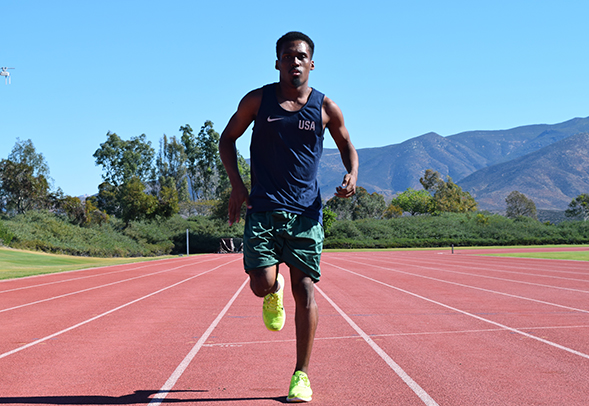Setting the Bar
A campus group is in the early stages of developing a comprehensive adaptive sports program for athletes with disabilities at SDSU.

San Diego State University kinesiology major Ahkeel Whitehead ranked 41st.
“I don’t think I’ve ever been more disappointed in myself,” Whitehead said. “I just felt like I had let everybody down. All of this support had been building up and then that was it.”
But Whitehead’s story doesn’t end there. After another nation's athletes were disqualified from competing in Rio, some athletes including Whitehead received a second shot at competing in the 2016 Paralympic Games.
“Of course I went from this unimaginably low point in my career to ‘How is this happening?’” said Whitehead, who has cerebral palsy that affects the left side of his body. “It was amazing. Because it happened that way, I was so much more thankful to be there.”
In September, he competed against some of the best Paralympic athletes in the world, an experience he describes as "life-changing." While he didn’t earn any medals in Rio, he was invited along with the entire U.S. Paralympic Team to visit the White House after they returned.
There’s no doubt Whitehead is passionate about competitive athletics for people with physical disabilities. Now a senior at SDSU, he trains regularly at the Olympic Training Center in Chula Vista.
Between taking classes and preparing for the next Paralympic Games, he said the past few months have been a blur. But they’ve also sharpened his focus on a new goal: to help create opportunities for athletes with disabilities to compete at SDSU.
“Going to Rio and experiencing that, I want everyone here at SDSU to experience adaptive athletics, whether they are able-bodied or not, or want to head to the Paralympics or not,” he said. “This is my way to give back, by creating an avenue to give people with disabilities a home and a chance to compete collegiately.”
Building from the ground up
During the past year, Adaptive Fitness Clinic instructor Kathy McCarty and College of Health and Human Services assistant professor Antoinette Domingo have been working to develop the Aztec Adaptive Sports Program.The program will provide opportunities for students that are interested in working in disability athletics.
“We want to have options so that no matter your ability, there is something here for you,” McCarty said. “We are creating a culture that is accepting of these sports.”
If all goes according to plan, the program would be the first collegiate-level adaptive sports program on the West Coast. Program officials brought Whitehead on board after McCarty met him in one of her classes.
“One day at the beginning of the semester, Ahkeel told me he would be competing in Rio, so I told him I had an idea he might be interested in,” she said. “As soon as I told him about our program, he lit up. Now, with his passion and the connections we’ve made through Student Disability Services, it’s starting to take off.”
Last year, Domingo was awarded a President’s Leadership Fund (PLF) grant to develop a wheelchair basketball program as part of the Aztec Adaptive Sports Program. With the generous support of donors, PLF projects support goals outlined in the university’s Strategic Plan including initiatives for research and creative endeavors, student success, community and communication.
McCarty also received a 2016 President's Leadership Fund Award for Faculty and Staff Excellence. She plans to use the $2,500 award to visit established collegiate adaptive sports programs to help create a strategic plan for the growing SDSU program.
Domingo’s research looks into the health and wellness aspects of physical activity for the physically disabled.
“There are so many benefits for people to participate in sports, such as increasing self-esteem and the quality of the collegiate experience, having strong peer support and reporting better health overall,” she said. “This program is related to student success, increasing diversity on campus and providing the same opportunities for all students including students who are disabled. We’re trying to level the playing field.”
Working collaboratively across campus
While it's still in the early stages, the working group has established a student organization called Aztec Adaptive Sports to bring awareness to the adaptive sports community.They are also working in collaboration with Student Disability Services to organize awareness events and to connect with additional campus entities.
Student Disability Services Director Pamela J. Starr said establishing an adaptive sports program would solidify a place for athletes with disabilities at the university.
“Student Disability Services supports this idea and wants to foster its growth, so we need to find a way so it works for the university and for our students,” Starr said. “As we want all of our diverse student populations to feel included on campus, this is an opportunity that allows this diverse population a place on campus, an athletic outlet and a social component.”
As part of the university’s Strategic Plan, President Elliot Hirshman has made a commitment to identify initiatives that create a supportive campus climate for people with disabilities through the university’s Committee for Enhancing Campus Culture and Climate for Persons of Varying Abilities (ECCC).
Through the Aztec Adaptive Sports Program, Whitehead said he hopes to change perspectives toward people with disabilities and what they can achieve.
“We are athletes just like anyone else,” he said. “We still have goals and dreams as well and try to live our lives to the fullest. San Diego State is the place for this.”



